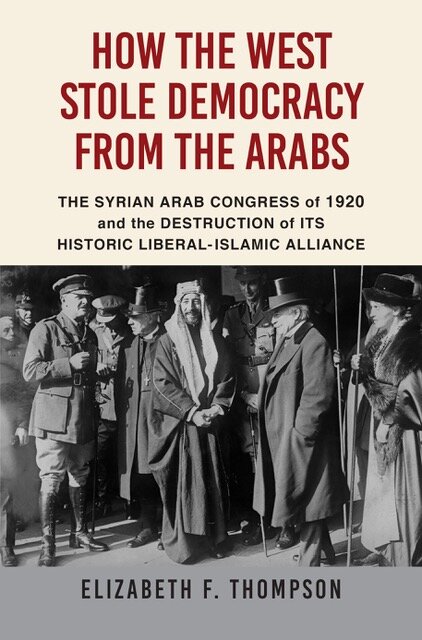
Books
April 21, 2020
When Europe’s Great War engulfed the Ottoman Empire, Arab nationalists rose in revolt against the Turks. The British supported the Arabs’ fight for an independent state and sent an intelligence officer, T.E. Lawrence, to join Prince Faisal, leader of the Arab army and a descendant of the Prophet. In October 1918, Faisal, Lawrence, and the Arabs victoriously entered Damascus, where they declared a constitutional government in an independent Greater Syria.
PRAISE FOR HOW THE WEST STOLE DEMOCRACY FROM THE ARABS
Rashid Khalidi, Edward Said Professor of Modern Arab Studies, Columbia University
“That the interests of great powers override the voices of small nations is an unremarkable observation”
Amaney A. Jamal, Edwards S. Sanford Professor of Politics, Princeton University
“Thompson has written an outstanding book on the attempts by Western actors to not only reverse democracy in Syria in the early twentieth century, but also to conceal the reality of this reversal.”
Juan Cole, Richard P. Mitchell Collegiate Professor of History, University of Michigan
“Elizabeth Thompson’s situating of the roots of radical Islam in the betrayals at Versailles and San Remo is breath-taking in its moral clarity.”
Leila Fawaz, Issam M. Fares Professor of Lebanese and Eastern Mediterranean Studies, Tufts University
“It is an essential read.”
Charles Glass, former ABC News Chief Middle East Correspondent
“This excellent and enlightening book ranks with Margaret MacMillan’s award-winning Paris 1919 as a ground-breaking work of both thorough scholarship and fine writing.”
“I thought I knew this story well. But the details she reveal in this riveting account often left me open-mouthed.”
James Barr, author of Lords of the Desert and A Line in the Sand
Excerpt of How the West featured by Literary Hub
Syria’s Doomed Struggle for Independence After WWI: Elizabeth F. Thompson on a Diplomatic Ruse That Transformed the Middle East
It is a commonly held idea that there is but one democracy in the Middle East. Not only is this false, but the ways it is uttered—as if the region has been one long failed blood battle for centuries and centuries—overlooks the fact that democracy was on the verge of flowering at the end of World War I. During the war, the British promised the Arabs an independent state, and in return, leaders of the Arab Revolt joined the Allies in World War I to capture Greater Syria from the Ottoman Turks in 1917-1918.
Prince Faisal, leader of the revolt’s Northern Arab Army, proclaimed the end of Turkish tyranny and a new era of constitutional government, where citizens would enjoy equal rights regardless of religion, upon the army’s arrival in Damascus in October 1918.
And here began the beginning of a deep and profound betrayal.
April 15, 2013
The Arab Spring uprisings of 2011 were often portrayed in the media as a dawn of democracy in the region. But the revolutionaries were―and saw themselves as―heirs to a centuries-long struggle for just government and the rule of law, a struggle obstructed by local elites as well as the interventions of foreign powers. Elizabeth F. Thompson uncovers the deep roots of liberal constitutionalism in the Middle East through the remarkable stories of those who fought against poverty, tyranny, and foreign rule.
February 5, 2000
French rule in Syria and Lebanon coincided with the rise of colonial resistance around the world and with profound social trauma after World War I. In this tightly argued study, Elizabeth Thompson shows how Syrians and Lebanese mobilized, like other colonized peoples, to claim the terms of citizenship enjoyed in the European metropole. The negotiations between the French and citizens of the Mandate set the terms of politics for decades after Syria and Lebanon achieved independence in 1946.


